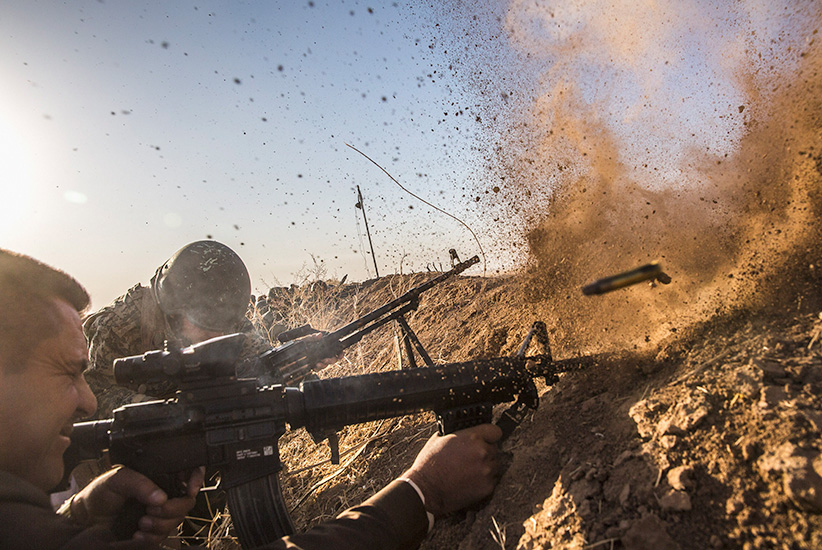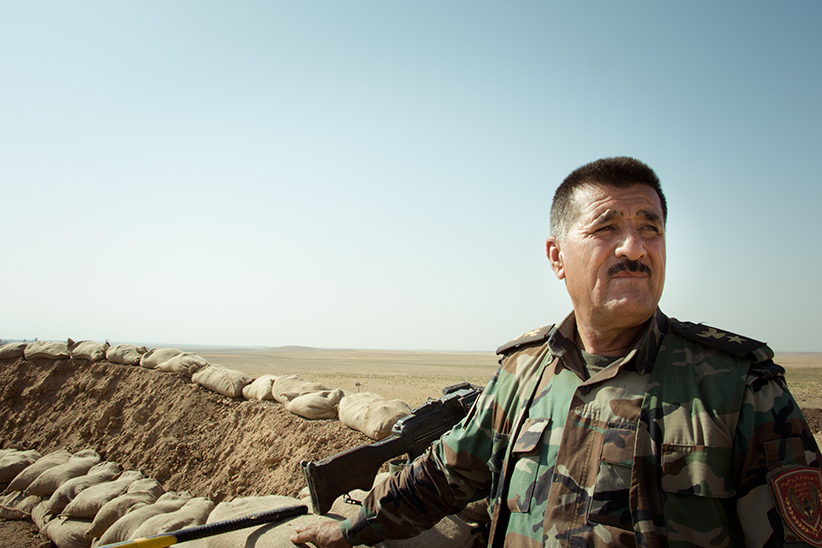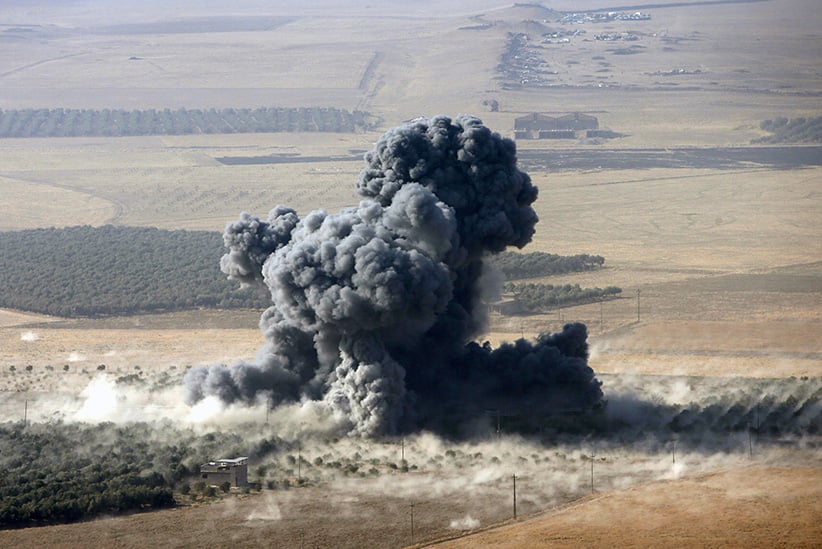What’s Canada’s role in Iraq? It’s bigger than you think
Canadian Special Forces are in the thick of the battle around Mosul. What comes next?
Kurdish pesh merga troops fire at Islamic State positions as they move toward the Iraqi town of Badana Pichwk on Monday morning, Oct. 17, 2016. Kurdish forces began Monday advancing on a string of villages east of Mosul, the start of a long-awaited campaign to reclaim Iraq’s second-largest city from the Islamic State, which seized it more than two years ago, officials said. (Bryan Denton/The New York Times/Redux)
Share

The way the commander of the Canadian-trained Zeravani forces in northern Iraq describes it, the scene could have been lifted out of Mad Max. On Oct. 17, as a coalition of Iraqi army and Kurdish fighters launched the long-awaited offensive into ISIS-controlled Mosul, Iraq, Canada’s JTF2 Special Forces did what elite fighters are wont to do: they joined the fight. But according to Col. Majid—a veteran of the Zeravani, a commando unit linked to the Interior Ministry of Iraq’s Kurdistan Region—the Canadians didn’t simply roll in riding armoured vehicles alongside their Zeravani counterparts.
“They were smart,” says the 52-year old veteran soldier, clearly impressed by the Canadians’ bravado. “The six or seven of them that I saw rode in on those four-wheeled motorcycles. They were quick and mobile. They pushed forward with us. They fought the battle with us. They fired missiles and destroyed suicide vehicles.”
Over the two years that around 70 of Canada’s JTF2 Special Forces soldiers have been deployed to Iraq’s Kurdistan Region, their role has morphed from what Stephen Harper first described as a backseat “advise and assist” mission, to one in which the Liberal government has conceded Canadians would be near the frontlines but only engaging in “defensive” actions, to what today appears to be direct participation in offensive operations.
Defence Department officials in Ottawa are typically vague on the specifics. “To ensure the safety and protection of our deployed personnel, the exact details of ongoing operations will not be disclosed,” an email response to a Maclean’s query read. “Our mandate has not changed. We are there to train, advise, and assist.”

But according to numerous interviews with Kurdish forces, conducted as Maclean’s toured the frontlines of the Mosul offensive last weekend, the Canadians played a significant role in the northern and eastern fronts led by the Kurds. The quad-riding commandos were perhaps the most dramatic example. But on other fronts near Mosul, Canadians were also in the thick of battle, helping the Kurds drive back Islamic State fighters and targeting suicide vehicles with anti-tank missiles.
The results have been impressive. Islamic State has collapsed on the fringes of its self-declared Iraqi capital. Village after village has fallen to the advancing Kurds, known as the peshmerga, paving the way for the Iraqi army to enter Mosul, which it did for the first time on Oct. 31, weeks earlier than expected.
Meanwhile, the Zeravani, which has been the main focus of Canada’s training mission in Iraq so far, has stopped its advance, digging into its positions, in some cases less than a kilometre from territory still controlled by Islamic State.
The Canadians have since pulled back as well, reverting to their advisory role. They can be seen driving around frontline positions in SUVs to consult with their Zeravani counterparts, though they refuse to speak to journalists. Unlike the U.S., Canada does not allow the media access to Special Operations soldiers. Here in Iraq, even the Zeravani joke about “Canada’s secret mission”—though there now appears to be nothing particularly secret about it.
The Canadian forward operating bases that dot the Zeravani-controlled fronts maintain the charade: concrete walls and razor wire surround the unmarked compounds. At one base, a group of soldiers, some shirtless in the 30° C heat, gather on a rooftop for some kind of meeting. A call to their translator requesting an interview produces a predictable, emphatic “no.”
It’s difficult to gauge what the danger might be, especially considering locals are perfectly aware Canadian soldiers occupy these compounds, and access to the fronts where they are located is strictly controlled by the Zeravani.

Back on the Zeravani frontline, despite a lull in fighting, the situation remains volatile. In Nawaran, 10 km north of Mosul’s outskirts, the Zeravani are in the process of fortifying their positions. ISIS was pushed out of this area on Oct. 20 but they have not gone far, in some places occupying villages less than a kilometre away. Armoured backhoes rumble over the reddish-brown earth, kicking up clouds of dust as they set up fresh berms and observation posts. Zeravani soldiers, mindful of Islamic State fighters nearby, lounge in the shade of concrete bomb shelters. Their nonchalance is not so much heroic as it is fatalistic: the only real danger here is mortar rounds, and mortar rounds are notoriously inaccurate. If one hits you, it is because the universe wishes it.
As if to make the point, a mortar lands with a dull thud not more than 400 m from the unfinished post, producing a telltale narrow plume of smoke. The Zeravani soldiers look on languidly. A few minutes later, a second round lands less than 200 m away. A few minutes after that, the Kurds respond with artillery fire. Then all falls silent again.
This is the back-and-forth poking and prodding that is typical to static frontlines. Earlier that morning, Col. Hussein Rashid, a deputy commander of the outpost, told Maclean’s that ISIS fighters had attempted to shift positions from a mosque in Derk village, a kilometre from his position, to a cluster of homes a few hundred metres away.
“Probably they were trying to set up a sniper position,” he surmises. “We called in an airstrike. I think we got them because there has not been any sniping today.”
The Nawaran frontline was a brutal battle, he adds, dominated by coalition airstrikes. All that is left of the nearest “liberated” village, Khorsabad, is a post-apocalyptic tangle of rubble and rebar, bristling with the booby traps that Zeravani commanders warn the retreating Islamic State fighters routinely leave behind.
While describing the battle, Hussein points out the hum of a coalition bomber circling overhead. “Out here, in the abandoned villages and open terrain, the militants are vulnerable,” he says. “Without human shields and the cover provided by buildings, any movement that reveals their positions is a death sentence.”
During the height of the offensive, it was here that Canadian Special Forces soldiers joined the battle in an armoured Humvee, Hussein adds. They also took up positions on a ridgeline overlooking the battlefield, firing mortars and directing the Zeravani forces below. “The Canadians did a lot to make sure we would win this battle,” Hussein says. “This whole area has been liberated because of their contribution.”
A few kilometres to the east, the battle was much different. The residents of Fazliya, a small town of about 6,000 nestled into the base of the ridge occupied by the Canadians, were not given the opportunity to escape before the Kurds arrived, forcing coalition bombers to avoid the kind of indiscriminate airstrikes that leveled Khorsabad.
Fazliya was left relatively intact, but its liberation was a preview of the much more difficult fight to come in Mosul, a sprawling city where an estimated 1.5 million civilians remain trapped. Unlike Khorsabad, which fell relatively quickly in the face of coalition airstrikes, Zeravani forces only managed to roll into Fazliya on Oct. 27, after a one-week siege. Locals say Islamic State fighters had retreated three days before the Zeravani arrived but the liberators took their time moving forward, fearing suicide bombers and snipers.
In the interim, Fazliya’s residents took the opportunity to cleanse themselves of all things Islamic State. Signs were torn down and the black flags of the self-declared caliphate removed. Locals raised white flags over their homes to signal to the Zeravani that it was safe to enter the town.
“The first thing I did was shave my beard,” says Ahmed, a 27-year-old former English teacher who lived through every day of the Islamic State’s 27-month long rule, providing only his first name. “Then I waited for the Kurdish forces to arrive.”
Now, not a single beard can be seen in Fazliya, a telling feature in a part of the world where Islamic conservatism is common. Many locals say they are worried about what comes next in their town. Rumours are spreading that Islamic State loyalists have also shaved their beards and melted in with the population.
Islamic State fighters are the immediate fear in this warzone, but a host of tensions dog the entire Mosul offensive. On Oct. 29, Iranian-backed Shia militias joined the fight, advancing from the west on the ISIS-held town of Tal Afar, 75 km from Mosul, in a bid to cut off supply lines to Syria. The move angered other ethnic and sectarian groups who fear the Shia will attempt to annex Mosul, a mixed city of Sunnis, Christians, Kurds and ethnic Turks. The ethnic and sectarian mix that has been Mosul’s pride for centuries now threatens to tear it apart.
But for Canadians, who have thrown in their lot with the Kurds, still bigger problems loom. The Zeravani say they are done pushing forward. A deal signed between them and Iraq’s central government stipulates that the Kurds will not participate in the fight to take Mosul city. The agreement has broad support in Iraqi Kurdistan. Eliminating Islamic State outside traditional Kurdish territory has never been the prime objective for the Kurds. Over the last two years, they have steadily expanded their territory in northern Iraq, filling the political vacuum as their forces have liberated territory occupied by ISIS. Kurds now control Kirkuk, an oil-rich city 175 km southeast of Mosul. With the help of Canada’s elite soldiers, the Kurdistan Region has ballooned to the east and south.
Helping the Kurds claim land from the Iraqi government for a future independent Kurdistan was never Ottawa’s intention, but it’s looking increasingly like this is what has happened. Col. Hussein, the Zeravani commander on the Nawaran front, says the Kurds have no plans to retreat back to Kurdistan’s official border once ISIS is defeated. “Mosul is not a Kurdish city,” he says. “It’s for Arabs. But the territory we have liberated belongs to the Kurds. God willing, it will remain with the Kurds.”
Iraq’s central government is not, of course, on the same page. Prime Minister Haider al Abadi has repeatedly warned the Kurds not to use the fight against Islamic State as an excuse to annex Iraqi territory.
The first signs of future conflict have begun to surface in Khazer, where Canada helped the Zeravani push even deeper into Iraqi territory. The advance, which launched the Mosul offensive, was fast and furious, lasting only a day and coming to a halt near Tarjala, a village nearly 10 km west of Kurdistan’s official border. From there, Iraqi Special Forces took the lead, pushing further west toward Mosul.
The meeting point of the two armies has become something of a de facto border. A few short metres are all that separate a Zeravani checkpoint from its Iraqi counterpart on the east-west road between Mosul and Erbil, the capital of the Kurdistan Region. Villagers who have taken shelter at camps for the internally displaced in Kurdistan are given permission slips by the Zeravani to return to their liberated villages but are then, after walking a few steps, rejected by the Special Forces.
“Look,” says a captain manning the Special Forces checkpoint, who refused to provide his name, “this slip is from the Zeravani. We are Iraqi army. They have their rules; we have ours. Sometimes the rules don’t match.”
Indeed, there appear to be no clear rules for how Iraq will sort itself out once the Islamic State is eliminated, nor have the limits to Canada’s involvement in the fight been clearly identified. Defeating ISIS has underpinned Ottawa’s rationale for sending aid to the Kurds, but now that the Kurds have stopped fighting Islamic State, what comes next? The fight for Mosul itself is expected to take weeks, if not months. Canada, if its support remains firmly with the Kurds, will be spectators to that battle.
But Canada’s relationship with the Zeravani also appears to be on shaky ground. While Zeravani commanders laud the contribution Canadian soldiers made during the Mosul offensive, they criticize Canada’s failure to provide the training and materiel they were promised. “The training they gave us was nothing new,” says Ato Zebari, the deputy commander of the Zeravani forces in Khazer. “We went through it expecting they would also provide us weapons. Then they promised they would set up a commando brigade of Zeravani. They said they would equip it and train it. That never happened.”
Zebari’s gripe is not unfounded. During a visit to Khazer in April, Canadian Chief of Defence Staff Jonathan Vance spelled out a plan to transform the Zeravani into an elite fighting force with “the weapons necessary to do the job they need to do.” The goal, he added, was to have the commando force ready for the Mosul offensive. That has not happened and no one knows exactly why, largely because of the secrecy surrounding Canada’s mission.
Defence officials in Ottawa are vague about exactly how that mission will evolve beyond defeating Islamic State. But based on its response to email queries, the emphasis on supporting the Kurds has changed.
“The Government of Canada is responding to the Government of Iraq’s request for military assistance in supporting their efforts to counter the threat presented by Daesh,” officials said, using the Arabic acronym for Islamic State. “We are continuing our planning efforts toward providing equipment to Iraqi Security Forces.”
The Kurds, front and centre during Vance’s April tour of the Zeravani frontlines, were not mentioned.
In the weeks and months ahead, some hard questions will need to be answered. What exactly was Canada’s goal in Iraq? Did officials know they were helping the Kurds build up an army for a future independent Kurdistan? Should that support continue post-ISIS? Canada’s elite soldiers have proven themselves on the battlefield, once again. Now it’s up to the politicians to prove it was worth it.